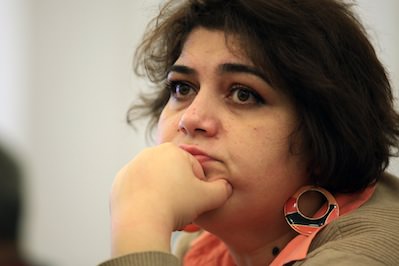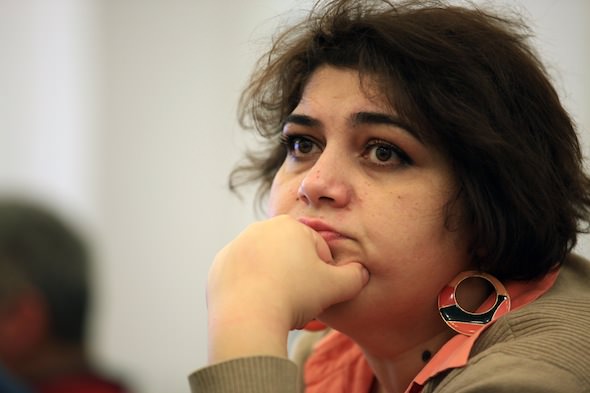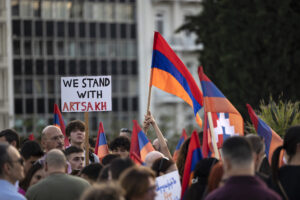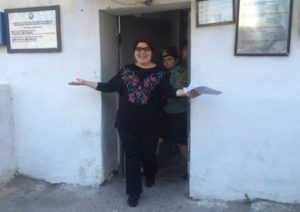Truthdigger of the Week: Azerbaijani Journalist Khadija Ismayilova (Video)
Since early December, the dissident journalist and Truthdig Global Voices contributor has sat in jail as Azerbaijan's money-drenched ruling family and its allies have tried to figure out how to silence her for good.Since early December, the Truthdig Global Voices contributor has sat in jail as Azerbaijan's money-drenched ruling family and its allies have tried to figure out how to silence her for good.

Jailed Azerbaijani journalist and Truthdig Global Voices contributor Khadija Ismayilova. AP/Aziz Karimov
Every week the Truthdig editorial staff selects a Truthdigger of the Week, a group or person worthy of recognition for speaking truth to power, breaking the story or blowing the whistle. It is not a lifetime achievement award. Rather, we’re looking for newsmakers whose actions in a given week are worth celebrating.
It can be much easier to spot oppression in other people’s countries than in one’s own. Take Azerbaijan, the glittering, oil-drenched, ostensibly liberal republic that lines the southwest bank of the Caspian Sea. Flogged by its tourism bureau across the globe as the “European charm of the Orient,” its mustachioed autocrat earned the Organized Crime and Corruption Reporting Project’s “Person of the Year” distinction in 2012. The reason is predictable. The group reported that “well-documented evidence” had established that President Ilham Aliyev’s “family has secret ownership stakes in the country’s largest businesses including bank, construction companies, gold mines and phone companies.” Earlier this year, Foreign Policy magazine called the Aliyevs the “Corleones of the Caspian.”
Although corruption depressingly appears to be a universal value, we can happily point to a pile of evidence that suggests the hatred of corruption and the love of undoctored truth are also prized throughout East and West.
Since early December, a prime exhibit in this series of hope has been the struggle of Khadija (pronounced “ha-DI-ja”) Ismayilova. As it was reported by major news outlets across the globe, the Aliyev government threw Ismayilova — a multiple award-winning Azerbaijani journalist, Truthdig Global Voices contributor and radio host who worked for the country’s arm of Radio Free Europe/Radio Liberty — in jail when she refused to stanch a torrent of articles that sketched a picture of the family’s secretive and growing private business empire. The reports revealed the Aliyevs’ ownership of large-to-majority shares in the country’s major construction, telecommunications, transportation and other businesses, many of which are paid with public money via contracts with the government.
The game is simple. Politicians direct taxpayer money to their friends, family members and themselves under the obfuscating cover of the system of incorporation or “public” ownership. The arrangement is repeated by scores of families in the United States, where large portions of the public have been led to believe it’s fair and respectable business.
In the 2013 documentary “Amazing Azerbaijan” (excerpts of it appear at the end of this post), Ismayilova told the filmmakers she had no personal or professional vendetta against the Aliyevs. She wasn’t “pursuing the president’s family everywhere. … Their names appear behind every business that I investigate.”
The covert campaign to silence Ismayilova took on threatening form in March 2012. She received a letter from an anonymous sender that called her a “whore” and contained photos taken from inside her bedroom. She was told to “behave.” She refused, and a video of her and her boyfriend, also taken inside the bedroom, appeared online. In a country where “honor killings” still occur, the publication of sexual content represents a threat to the target’s life. Ismayilova bought a tent to keep in her living room for moments when she wanted absolute visual privacy, but threw it away after one day, deciding she didn’t want others to decide how she would live. In another instance she learned from a telecommunications employee that her home telephone had been tapped.
In June 2013, Aliyev signed a bill that made it illegal to obtain documents containing the identities and other information pertaining to company owners. Thus in the name of “commercial interest,” acquiring knowledge of the business community’s secretive dealings became a crime against the state.
Ismayilova was first arrested in 2013, when she and dozens of other peaceful protesters were seized during a demonstration in support of the Aliyev government’s political enemies. She was sentenced to community service. Last month, at the end of a year of harassment by the government, she was arrested again on the absurd-sounding charges that she had caused a man to attempt suicide. A conviction would put her in jail for three to seven years. After her arrest, she was sentenced to two months of pretrial detention. The prosecution will presumably take that time to try to come up with a case.
Ismayilova anticipated her latest arrest in early 2014. During questioning over a separate case against her, she published a note titled “If I Get Arrested.” In it, she said she’d like her case to be used to call attention to the oppressive rule of the country’s elite, and that any support given to her should help political prisoners as well, including the many journalists held in the government’s prisons:
WHEN MY CASE IS CONCERNED, if you can, please support by standing for freedom of speech and freedom of privacy in this country as loudly as possible. Otherwise, I rather prefer you not to act at all.
I don’t want any private diplomacy for my case. I don’t believe in human rights advocacy behind closed doors. People of my country need to know that human rights are supported.
I also don’t want any release-appreciation trade for my release. My possible arrest will be just one of more than [a] hundred politically motivated arrest[s]. The government of Azerbaijan has managed to use [the revolving door system of incarceration to get] positive feedback from the West: releas[e] one prisoner, get praised, arrest [another] two.
After her arrest this December, the government shuttered the doors of Radio Free Europe, rounded up its reporters and intimidated with threats of force those who might refuse to cooperate. A person close to Ismayilova who asked not to be named for fear of retaliation by the Azerbaijani government told Truthdig the reporter was the last effective big-name, pro-public-dissident journalist the country had. In the video below, Ismayilova shares her guilt and grief over the sense that another journalist was killed because he was investigating corruption and the government alone. “I’m trying to make sure I’m not the only one who does this,” she said elsewhere. “And I’m not. I have students who are doing this, I have colleagues. If they kill me, silence will not fall.”
After her arrest in December, Ismayilova managed to sneak a letter out of her cell. When the authorities demanded that she tell them how she did it she responded, “telepathically.” And when they demanded that she incriminate a prison employee by signing a statement saying she cajoled the worker in to smuggling it for her, she refused. Here’s the letter:
My dear friends!
Here in pretrial detention, my thoughts are with you. My only regret is that here I am restricted from helping you.
You are doing an important job helping oppressed people. Happy New Year to you and all like-minded people.
I am full of hope on the eve of this New Year that truth and justice will win.
Arrests and restrictions are part of our mission in telling the truth. My arrest proves one more time that it is important to make change happen: We need to build a new reality where truth will be a norm of life and telling the truth will not require courage.
You all know why I am here in prison. Uncovering corruption is the real reason. And the only way to prove oppressive regimes wrong is to continue uncovering corruption, to continue defending the rights of oppressed people. Yes, there is a price to pay. But it is worth it!
As Nazim Hikmet, the Turkish poet, wrote: “Those who carry the teardrops of their siblings as a heavy burden upon their neck shouldn’t follow our path.”
Stay strong!
Keep doing a good job!
More investigations, more efforts for justice and human rights — this is my wish for 2015.
Peace, Khadija
Ismayilova’s situation is terrifying. The Aliyevs and their peers in government and business, a group that banned all international broadcasters from the country’s radio frequencies, have the will and the means necessary to silence her for good. That she’s still alive may be down to the fact that she is sufficiently visible worldwide that Azerbaijan’s leaders fear losing political and business support from Western governments that claim to value human rights. They may not kill her, or they may not do it soon, but for now her work has been stopped. In the hope that public pressure builds and effects her release, we honor Khadija Ismayilova as our Truthdigger of the Week.
Independent journalism is under threat and overshadowed by heavily funded mainstream media.
You can help level the playing field. Become a member.
Your tax-deductible contribution keeps us digging beneath the headlines to give you thought-provoking, investigative reporting and analysis that unearths what's really happening- without compromise.
Give today to support our courageous, independent journalists.







